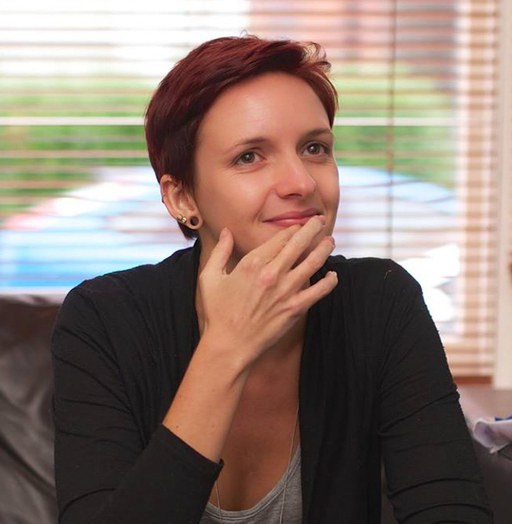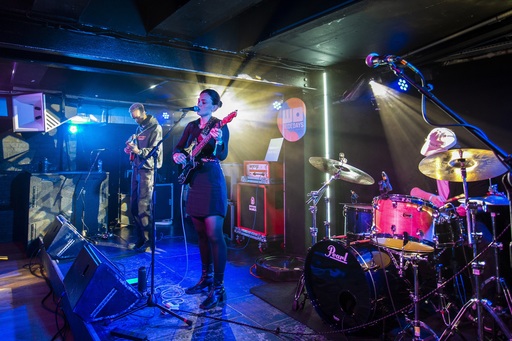Arts Under Pressure: Scotland's Art Scene in 2025
Venue closures. Funding chaos. A cost of living crisis. Last year was not a banner one for Scotland's arts and culture sector. We ask some members of this community how things might improve in 2025
I think I speak for everyone with even a smidgen of interest in the Scottish arts scene when I say, thank fuck 2024 is over. Fissures had long been visible within Scotland's cultural infrastructure thanks to 15 years of austerity and the lingering aftershock of a global pandemic, but in 2024 it truly felt like these hairlines had opened up to full-blown foundational cracks and the whole arts sector was crumbling around us. Long-standing venues essential to nurturing the vibrant scene here have rarely looked more vulnerable, while for individual artists, traditional revenue streams like music royalties and book advances continue to shrink as the cost of living soars.
As a result, artists and arts organisations are more reliant than ever on government support, which has been at a standstill for years, but even these meagre funding schemes seemed on the brink of collapse in 2024. Despite multiple pledges by the Scottish Government to properly fund the sector, a shortfall of £6.6 million resulted in the temporary closure of the essential Open Fund for individual artists in the summer. The dysfunction reached a crescendo in October when it was announced that all the regularly funded organisations (RFOs) who had spent much of last year devising three-year business plans for the new Multi-Year Funding programme would have their applications put on hold while the Scottish government tried to work out how much change they could find down the back of Bute House's sofa.
Those RFOs will now find out their Multi-Year Funding results at the end of this month, and the draft budget announced by the Scottish government in early December does look positive, with the announcement that an additional £20 million will be added to the Multi-Year Funding pot. Culture Secretary Angus Robertson claims the additional funding will prove "transformational."
Pressure on artists
Ahead of these "transformational" funds actually being awarded, the arts in Scotland are very much in a Schrödinger's cat situation, but even if we are moving into a healthier funding landscape as promised, there is much damage to be undone by the last few years of uncertainty. The Glasgow-based author Heather Parry sums it up pretty succinctly. “I think it's right to say that everyone is just exhausted,” she tells me. “Everyone’s tired of having to fight for proper remuneration for their work, tired of the lack of long-term stability, tired of trying to carve out the time and inclination to be creative when they increasingly have to do 'money work' to support their creative careers.”
Parry reckons the current pressure on writers, and other artists in general, isn’t just down to the chaos of the last few years. She describes this pressure as cumulative, coming from the underfunding of artists directly and the steep drop they've seen in earnings for their work over the last decade or so. “You can't really uncouple the effect of Spotify and the increasing costs of touring from the fact that more musicians will be seeking government funding, for instance,” she says. “Similarly, the diminishment of advances and of marketing budgets across the publishing sector (unless, of course, you're one of the bigger names) can't be uncoupled from the fact that so many more writers are seeking government funding or support from organisations like The Royal Literary Fund or The Society of Authors, reaching out for hardship grants more than they ever have before.”

Glasgow-based author Heather Parry. Photo: Dave Parry
And what kind of work is created in such an environment, where artists might spend more time researching what funding is available and filling in forms than actually, you know, being creative? Parry's worry is that it might end up being work of the most compromised kind. “If you're needing to ask for funding for a project, you might shear off all the rough edges or anything that might be provocative lest you face either funding denial or the public kicking up a massive fuss about your work being immoral (as we have seen happen this last year or so). This means we could be missing out on spectacular, era-defining books because the author thinks it won't sell, or the public won't like it being funded.”
Pressure on arts organisations
So it’s been tough for individual freelancers in Scottish arts, but what about our organisations – the collectives, the galleries, the theatre troupes? One organisation that’s eagerly awaiting the Multi-Year Funding results is Glasgow Short Film Festival. Its director, Matt Lloyd, has been working within Scotland’s film exhibition and film festival sector for over two decades now, and for him, the most significant pressure he's feeling is the one that everyone is: the cost of living crisis. “I think in the context of an ongoing cost of living crisis it’s a challenge to make events affordable to all and to meet our Living Wage employer obligations while receiving what is effectively a real term cut in funding each year,” he tells me. Finding other sources of revenue is extremely tricky in such a climate. “Many of the companies that might sponsor us – almost exclusively from within the film sector – are also struggling at the moment and are therefore not in a position to offer cash support,” says Lloyd.
Finding sponsorship from outside the world of film is fraught though, particularly for an organisation like GSFF that has a reputation for ethical practices, social responsibility and solidarity with oppressed people (see its firm stand against the devastating violence in Gaza during its 2024 edition). “Obviously there are considerations of ethical fundraising and artwashing which have become more pronounced in the last year,” says Lloyd, who’s perhaps thinking specifically of the slew of galleries and book festivals (including Edinburgh International Book Festival) that announced they will no longer be receiving funds from Baillie Gifford amid concerns of its fossil fuel investments and links to Israeli tech and military companies. Lloyd says this hasn’t been a big issue for GSFF, but admits “we have turned down offers of support or chosen not to work with certain businesses for ethical reasons.”
A painful but obvious solution for a festival like GSFF is to try and cut its cloth to suit: put on an event that’s less ambitious than the last. But this can have its own pressures, especially when it comes to trying to secure future funding. “There is an expectation of growth year on year,” says Lloyd, “and project funding is offered for new ‘exciting' pilot projects rather than to support the development of existing ongoing activity – that’s unsustainable, there’s a real risk of over-reach and burnout.”

Iona Zajac on stage at Wide Days 2023. Photo: Jannica Honey
I hear similar sentiments from Olaf Furniss, the co-founder of the Edinburgh-based music convention Wide Days. Particularly trying for him is the valuable time spent filling out long-winded applications for unwieldy and extremely competitive one-size-fits-all funds. “Applying for grants, particularly from Creative Scotland, is often an onerous task and I’ve known people who have ended up ill as a result, myself included,” Furniss tells me. “Even when you spend weeks putting together the application and meet all the requirements, there is absolutely no guarantee you will be successful.”
Furniss experienced this first-hand early last year when Wide Days' 2024 application was turned down. “I was rejected in spite of it being recommended by [Creative Scotland]’s music officer and the 2023 event paying over 100 people, including all the showcase acts,” he tells me. “Moreover, an independent study in 2023 put our economic impact at £10.1m for the sector.” The 2024 event did go ahead thankfully, but only by cutting his own wages. “My business partner and I agreeing to abandon all the fair work principles where they applied to us, the irony being that applicants [to Creative Scotland] are required to detail their approach in this area.”
Parry has also been broken by Sisyphean funding admin. On top of her own writing, she is the co-founder and managing director of Extra Teeth, the knockout literary magazine that’s been supporting Scotland’s writing scene since 2019. The mag was initially financed through crowdfunding but has subsequently received project funding from Creative Scotland and the National Lottery, but like Furniss, she’s found the experience an enormous drain on her and her team’s energy and resources.
“Artists who set up projects to support other artists are not business graduates,” she laments. “Many of us are forced to learn these skills to apply for government funding and they're not natural to us. Even some of the largest arts organisations in the country only have a couple of full-time staff and the amount of unpaid labour that goes into applying for the highly-competitive government funding strands is unbelievable and completely unsustainable.”
Pressure on venues
The extent of the damage wreaked by this perfect storm of spiralling costs and over-subscribed funding in the Scottish arts scene is perhaps most evident by the alarming number of closures of arts venues in Scotland in the last few years. Some of the biggest scalps include The Filmhouse in Edinburgh, Glasgow’s queer workers’ co-op Bonjour and The Blue Arrow Jazz Bar, also in Glasgow. Summerhall, arguably the Scottish capital’s most important multi-arts venue, is also effectively closed in the wake of a dispute with HMRC and is in the process of being sold. And there’s currently a temporary closure of Glasgow’s most vital multi-arts hub: Centre for Contemporary Arts, which has shut its doors over the winter to 'recover financially', with the aim to reopen in April when Creative Scotland’s new Multi-Year Funding kicks in.
This will be too late for Glasgow Short Film Festival, which returns for its 18th edition in March. “CCA usually provides us with two cinema auditoriums plus additional meeting, event and installation spaces,” says Lloyd. “So naturally its loss has had a huge impact on planning this year’s programme.” It’s not just the logistics of finding a new venue that’s giving Lloyd and his small team a headache, it’s that there are no other suitable arts venues that are as affordable. “Due to CCA’s unique open source approach to working with outside organisations, we pay them no venue hire fee, we just cover some staff costs,” he explains. “So there is not a budget that can easily be transferred to another venue. While we have secured an alternative space which will potentially open us up to new audiences, it has impacted the scale and scope of this year’s programme.”

Illustration: Jack Murphy
As Lloyd says, there is no other venue in Glasgow quite like the CCA, and its closure, even for a short period of recovery, will be deeply felt across the city’s arts scene. “CCA has been uniquely vital in the development of GSFF and a diverse range of festivals and independent exhibitors,” says Lloyd. “In recent years improvements such as the introduction of DCP projection in its cinema have really opened up the venue’s possibilities. Pop-up screenings are all fine and good, but CCA provides access to industry-standard projection to anyone wanting to put on a film night without requiring a massive outlay.”
Clearly for Lloyd, the venue is absolutely vital. For it not to be a resource available to the city would be unthinkable. “If not having it as a venue for GSFF25 is the price for CCA's long-term survival, I’m prepared to pay that,” he says.
Radical rethink
The current situation of closures, burnout and precarious funding does not suggest a functioning arts scene, let alone a thriving one. Clearly we need a rethink.
Like many artists, Parry is keen to see some sort of Universal Basic Income introduced into Scotland. “It's currently being implemented in Ireland, and I would love to see a similar thing trialled here.” Two thousand Irish artists are currently receiving a Basic Income for the Arts (BIA), which aims to support the arts and creative practice by giving a payment of €325 a week to artists and creative arts workers. “It's not perfect, of course,” says Parry, “and there will be criticisms of the fact that it's not universal to all artists in Ireland, or that the amount of money given isn't higher, but all the feedback suggests that it is allowing for the creation of new work, the taking of risks, and the cessation of the underlying financial stress that's become normal to those working in the arts.”
Furniss is also keen to see how the BIA trial plays out, and he also cites other initiatives he’s come across in his travels. “In Sweden, the government has a requirement that new public buildings allocate 1% of their budget to art,” he tells me, “while in Mexico visual artists are able to pay their tax with paintings or sculptures. These are the sort of things we should be looking at in Scotland.” Furniss also has some of his own revenue-generating suggestions: “I am in favour of a model where artists who receive public investment for recording commit to a royalty going back into a public fund to support future generations of acts.”
Of course, the easiest solution would be for a more equal distribution of wealth for everyone. “The cost of living doesn't just affect writers but also their readers,” notes Parry. “And if people can't afford to buy books, then sales are going to go down. You might not think that something like rent controls or a higher living wage would support sales of books, but of course it does. The more expendable income people have, the more they'll spend on things like the arts.”
Despite all these hardships, however, films and music and theatre and art continues to be made in Scotland. Festivals are held, books are published, and gigs continue to be put on in every corner of this country.
“Scotland punches above its weight in making great music right across the genre spectrum,” says Furniss. “There are amazing artists and labels, and creatively I believe the scene is as healthy as it ever has been. It is also worth highlighting that in just a few years, two Edinburgh events – Terminal V and FLY – have established themselves as two of the UK’s most important promoters of electronic music events, both at home and outside Scotland.”
When I ask Parry about any silver linings on the horizon, she suggests the tenacity of creatives in Scotland and specifically the way they are able to channel the difficulty of the present moment into groundbreaking, genre-defying, bold and brilliant work. “We're exhausted, we're burned out and we're demoralised and yet people are still striving to support their peers, establish new projects and create the most incredible art,” she says. “The talent is here and it's working so, so hard. What we need now is a government that will commit to creating a long-term, sustainable, risk-supporting industry that holds up all creatives regardless of their personal financial position. Currently we are looking at an arts industry that is the preserve of those who have money, and we cannot watch as all other artists are excluded. We need the arts to be for all."
Heather Parry's new novel, Carrion Crow, is out in Feb from Penguin
Learn more about Extra Teeth at extrateeth.co.uk
Glasgow Short Film Festival 2025 takes place 19-23 Mar; glasgowshort.org
Wide Days 2025 takes place 1-3 May; widedays.com
